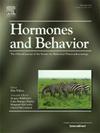How a territorial challenge changes sex steroid-related gene networks in the female brain: A field experiment with the tree swallow
IF 2.4
3区 医学
Q2 BEHAVIORAL SCIENCES
引用次数: 0
Abstract
Territorial competition can stimulate secretion of testosterone (T), which is thought to act on neural circuits of aggression to promote further aggression. Here, we test the hypothesis that competition modulates sex steroid sensitivity and conversion in the brain, focused on the female tree swallow (Tachycineta bicolor). In this bird species, exogenous T enhances female aggression, but social competition for limited nesting territories does not stimulate systemic T elevation. We exposed free-living females to simulated territorial intrusions and sampled five regions of the vertebrate social behavior network (SBN). Using quantitative PCR, we measured mRNA abundance of: androgen receptor, 5-alpha reductase, estrogen receptor alpha, and aromatase. Using standard analyses, we found essentially no treatment effect on mRNA abundance in any one brain area; however, network analyses revealed marked socially-induced changes in gene co-expression across the SBN. After a territorial challenge, gene expression was more positively correlated with T, and genes specific to the androgen-signaling pathway were also more positively correlated with one another. The challenged brain also exhibited stronger negative correlations among genes in the nucleus taeniae, but stronger positive correlations between the lateral septum and bed nucleus of the stria terminalis. Together, these findings suggest that, in response to female-female territorial challenges, T acts on androgen-mediated circuits of aggression, with some divergence in gene regulation in the nucleus taeniae. The post-transcriptional consequences of these shifts require more research, but their existence underscores insights to be gained from analyzing the neuroendocrine properties of the SBN using network-level perspectives.
领土挑战如何改变雌性大脑中与性类固醇相关的基因网络:树燕的野外实验
领土竞争可以刺激睾酮(T)的分泌,睾酮被认为作用于攻击神经回路,促进进一步的攻击。在这里,我们以雌性树燕(Tachycineta bicolor)为研究对象,验证了竞争调节大脑中性类固醇敏感性和转换的假设。在这种鸟类中,外源T增强了雌性的攻击性,但对有限筑巢区域的社会竞争并不会刺激全身T的提升。我们将自由生活的雌性暴露在模拟的领土入侵中,并对脊椎动物社会行为网络(SBN)的五个区域进行了采样。利用定量PCR技术,我们测量了雄激素受体、5- α还原酶、雌激素受体α和芳香化酶的mRNA丰度。使用标准分析,我们发现治疗对任何一个大脑区域的mRNA丰度基本上没有影响;然而,网络分析显示,SBN中基因共表达的显著社会诱导变化。领地挑战后,基因表达与T呈正相关,雄激素信号通路特异性基因之间也呈正相关。挑战脑的带状核基因之间也表现出较强的负相关,而外侧隔与终纹床核之间则表现出较强的正相关。综上所述,这些发现表明,为了应对雌性之间的领土挑战,T在雄性激素介导的攻击回路中起作用,但在带核中基因调控存在一些差异。这些转变的转录后后果需要更多的研究,但它们的存在强调了从网络层面的角度分析SBN的神经内分泌特性所获得的见解。
本文章由计算机程序翻译,如有差异,请以英文原文为准。
求助全文
约1分钟内获得全文
求助全文
来源期刊

Hormones and Behavior
医学-行为科学
CiteScore
6.70
自引率
8.60%
发文量
139
审稿时长
91 days
期刊介绍:
Hormones and Behavior publishes original research articles, reviews and special issues concerning hormone-brain-behavior relationships, broadly defined. The journal''s scope ranges from laboratory and field studies concerning neuroendocrine as well as endocrine mechanisms controlling the development or adult expression of behavior to studies concerning the environmental control and evolutionary significance of hormone-behavior relationships. The journal welcomes studies conducted on species ranging from invertebrates to mammals, including humans.
 求助内容:
求助内容: 应助结果提醒方式:
应助结果提醒方式:


